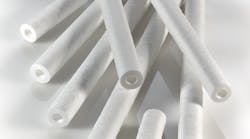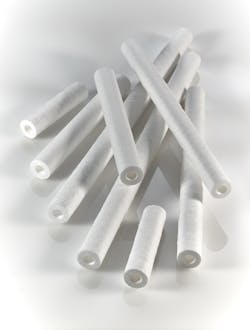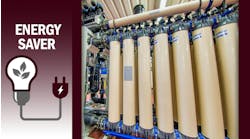For many years, Leverkusen, Germany-based Levaco Chemicals GmbH — which produces dispersants, emulsifiers, wetting agents, defoamers and superabsorbent polymers — has relied on phenolic resin filter cartridges to homogenize amine condensate that is used in coatings. However, increasing costs, long delivery times and the environmental impact of the filter material spurred the chemical company to look for alternatives. In 2021, the decision was made to replace phenolic filter cartridges with nylon ones.
SUPPLY ISSUES
Being shatter-resistant, torsional-resistant and heat-resistant, phenolic resin has been a popular product in industrial applications for decades. This material is a thermosetting plastic and is still in use today as a filter material as it demonstrates the high level of temperature and pressure resistance that is necessary for filtering aggressive media. However, phenolic resin availability is scarce, which means rising prices and long delivery times.
To prepare its production processes for the future and reduce its ecological footprint, Levaco (a former member of the Bayer Group) started looking for alternatives. The challenge: process parameters were not allowed to be changed. In order to find a suitable replacement, Eaton Technologies GmbH, Netterscheim, Germany, tested various filters and the filtration specialist was able to offer Levaco an option that can outperform phenolic resin filter cartridges, both in terms of cost and environmental impact.
HOMOGENIZATION CHALLENGE
One of the intermediate products in Levaco’s coating solutions division is an amine condensate agglomerated with dichloroethane. Filter cartridges made from phenolic resin have long been an essential process component in the manufacture of this product. This gel-like fluid also serves as a base material for pigments and fillers. It particularly helps to improve the protective properties of paints and coatings, which are essential for many industrial applications.
To achieve the desired consistency, the amine condensate is mixed with water. This produces inhomogeneous agglomerates, which have a negative influence on product quality. The filter cartridges are therefore primarily used in the process to distribute the particle sizes evenly so that a homogeneous product can be produced.
SUITABLE ALTERNATIVE
The exceptional properties of phenolic resin filter cartridges did not make it easy to find an alternative. High temperature and pressure resistance and strong chemical resistance are reasons filter cartridges made from this all-rounder material have been the standard for a long time.
Eaton suggested polyamide as a possible alternative since it can withstand greater pressure and higher temperatures than polyester or polypropylene. The available filter ratings are approximately equal to those for phenolic resin and may even be better in some cases. The company's Loftrex Nylon filter cartridges (Figure 1) were therefore good for Levaco’s application.
Indeed, the melt-blown filter cartridges made from polyamide can withstand high operating temperatures of up to 248°F and a differential pressure of up to 36 psi at ambient temperatures. The result is a powerful and durable filter cartridge made of a fine-pored material. Its particularly smooth surface also significantly reduces fiber migration — an added benefit for the process at Levaco as any filter fibers released form impurities that can reduce the product quality.
COST SAVINGS
Eaton's filtration engineers chose Loftrex Nylon filter cartridges with a retention rating of 100 µm to provide the ideal homogenization of the amine condensate. With optimized differential pressure and flow rate, Levaco can use the same filter cartridges for up to five batches of the product. A total of 75 filter cartridges are in use at the company, spread across a 50-cartridge housing and a 25-cartridge housing (Figure 2). Together, they enable a high throughput of 44 gpm. By using a number of filter cartridges in parallel, the performance of the cartridges very quickly begins to have noticeable economic benefits.
The service life of the new polyamide filters is about double that of the old phenolic resin filters. For Levaco, this means that product quality remains the same, while considerably fewer consumables are required. In addition, polyamide is an easily available filter material. Eliminating supply constraints is paramount.



